 6 citations,
August 2019 in “Indian drugs”
6 citations,
August 2019 in “Indian drugs” Ethosomes improve drug delivery through the skin and show promise for treating male pattern baldness.
 April 2019 in “Journal of the Dermatology Nurses’ Association”
April 2019 in “Journal of the Dermatology Nurses’ Association” A 37-year-old man with hair loss and skin issues was successfully treated with oral antibiotics, highlighting the need for early treatment. Long-term care includes low-dose antibiotics and avoiding caps and wigs.
 1 citations,
September 2013 in “Fertility and Sterility”
1 citations,
September 2013 in “Fertility and Sterility” Finasteride discontinuation increases sperm count in men.
 January 2016 in “International journal of basic and clinical pharmacology”
January 2016 in “International journal of basic and clinical pharmacology” Steroid use can cause a rare eye condition called central serous retinopathy, which can lead to permanent vision damage.
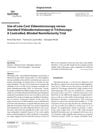 10 citations,
January 2015 in “Skin appendage disorders”
10 citations,
January 2015 in “Skin appendage disorders” Low-cost videomicroscopes are not as reliable as standard videodermatoscopes for scalp examination due to lower image quality.
 1 citations,
March 2023 in “International Journal of Trichology”
1 citations,
March 2023 in “International Journal of Trichology” Platelet-rich plasma didn't increase hair length but may help keep hair follicles alive.
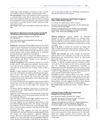 March 2020 in “QJM: An International Journal of Medicine”
March 2020 in “QJM: An International Journal of Medicine” SVF and PRP improve hair loss, but SVF causes more side effects.
 July 2024 in “Clinical Cosmetic and Investigational Dermatology”
July 2024 in “Clinical Cosmetic and Investigational Dermatology” Non-drug therapies show promise for hair regrowth but need more research.
 December 2022 in “Türk biyokimya dergisi”
December 2022 in “Türk biyokimya dergisi” The conclusions are: fecal short-chain fatty acids may help prevent cancer, fiber intake can reduce obesity, weight loss is hard for obese people, low BMI cancer patients are more prone to chemotherapy side effects, intermittent fasting benefits gut health, cherry laurel has health benefits in rats, certain gene variations can increase stress in hair loss patients, fecal acids can affect blood sugar levels, cold agglutinin can affect blood test results in autoimmune patients, and people with Crohn's disease have higher levels of a certain chemical in their blood.
 December 2020 in “Skinmed”
December 2020 in “Skinmed” Zinc levels are not significantly different in people with hair loss conditions like Androgenetic Alopecia and Alopecia Areata.
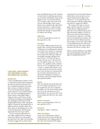 August 2015 in “Advances in Small Animal Medicine and Surgery”
August 2015 in “Advances in Small Animal Medicine and Surgery” Low-level laser therapy may help regrow hair in dogs with non-inflammatory hair loss.
 101 citations,
January 1985 in “British Journal of Dermatology”
101 citations,
January 1985 in “British Journal of Dermatology” Spironolactone is effective for treating acne, hirsutism, and androgenic alopecia in women with few side effects.
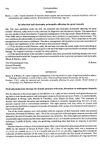 11 citations,
January 1985 in “British Journal of Dermatology”
11 citations,
January 1985 in “British Journal of Dermatology” The document concludes that an inherited nail condition often improves on its own, and spironolactone effectively treats acne in women.
January 2018 in “Iranian Journal of Pharmaceutical Sciences” Urea, eucalyptus oil, and menthol improve minoxidil skin absorption.
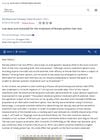 August 2024 in “Skin Research and Technology”
August 2024 in “Skin Research and Technology” Low-dose oral minoxidil can help increase hair growth in women with hair loss.
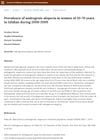 2 citations,
December 2016 in “Journal of Pakistan Association of Dermatology”
2 citations,
December 2016 in “Journal of Pakistan Association of Dermatology” Almost 40% of women aged 20-70 in Isfahan had hair loss, with it being more severe in those with low ferritin levels.

Many young women have Polycystic Ovarian Syndrome (PCOS), which is often linked with irregular periods, depression, low self-esteem, and insomnia. Lifestyle and diet changes, along with regular counseling, can help manage these symptoms.
 May 2024 in “Research Square (Research Square)”
May 2024 in “Research Square (Research Square)” Pediatric androgenetic alopecia is linked to obesity, family history, hormonal imbalances, and requires personalized treatment including managing comorbidities.
 January 2025 in “Expert Opinion on Drug Delivery”
January 2025 in “Expert Opinion on Drug Delivery” Nanocarriers could improve hair loss treatment but need more research for effectiveness and safety.
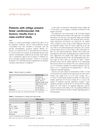 17 citations,
December 2011 in “Journal of the European Academy of Dermatology and Venereology”
17 citations,
December 2011 in “Journal of the European Academy of Dermatology and Venereology” People with vitiligo may have a lower risk of heart disease.
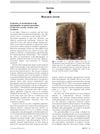 6 citations,
December 2021 in “Journal of The American Academy of Dermatology”
6 citations,
December 2021 in “Journal of The American Academy of Dermatology” Scalp photography helps patients feel less anxious about hair loss, agree more with doctors on severity, and stay motivated for treatment.
 6 citations,
January 2017 in “Annals of Dermatology”
6 citations,
January 2017 in “Annals of Dermatology” More exercise might link to hair loss, but other factors also matter.
 September 2024 in “Archives of Dermatological Research”
September 2024 in “Archives of Dermatological Research” The light-guiding microneedle patch effectively stimulates hair growth in androgenetic alopecia without serious side effects.
 September 2017 in “Springer eBooks”
September 2017 in “Springer eBooks” Low-level laser therapy seems to promote hair growth but requires more research to confirm its effectiveness.
![Minoxidil and Its Use in Hair Disorders: A Review [Corrigendum]](/images/research/d5b5fb1b-96a4-4e61-a554-3fe9a1f78497/small/11472.jpg) 1 citations,
February 2020 in “Drug Design Development and Therapy”
1 citations,
February 2020 in “Drug Design Development and Therapy” Low-dose Minoxidil combined with Spironolactone helps reduce hair loss and improve hair density in women, with some mild side effects.
 January 2017 in “Revista da Universidade Vale do Rio Verde”
January 2017 in “Revista da Universidade Vale do Rio Verde” Finasteride is commonly used for male pattern hair loss but has potential risks, including irreversible sexual dysfunction.
 January 2024 in “Circulation”
January 2024 in “Circulation” Certain genetic mutations can lower bad cholesterol and reduce heart disease risk, leading to effective cholesterol-lowering drugs.
 January 2023 in “Editora Enterprising eBooks”
January 2023 in “Editora Enterprising eBooks” The document discusses various research topics relevant to Brazil's social and scientific development.
 January 2023 in “Editora Enterprising eBooks”
January 2023 in “Editora Enterprising eBooks” Neuropsychopedagogy positively impacts education quality.

Media coverage led to more dermatologists prescribing low-dose oral minoxidil for hair loss.
























![Minoxidil and Its Use in Hair Disorders: A Review [Corrigendum]](/images/research/d5b5fb1b-96a4-4e61-a554-3fe9a1f78497/small/11472.jpg)




